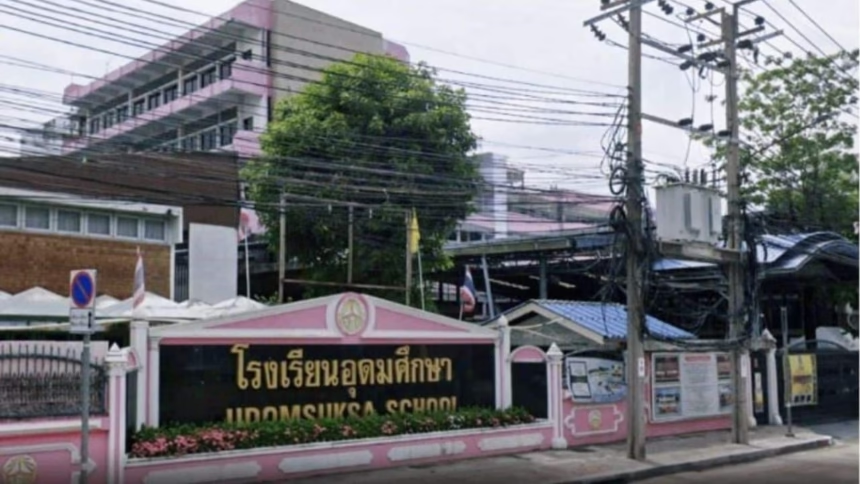BANGKOK – Udomsuksa School, a private institution founded in 1975, has announced it will close at the end of the 2025 academic year. The decision follows a sharp fall in student numbers, linked to Thailand’s declining birth rate and a rapidly ageing population.
Assoc Prof Kasemsri Watcharasakunee established the school with a focus on balanced learning for a changing Thailand. Over seven rai of green grounds, it offered 61 classrooms, a two-storey sports hall, and a programme that mixed strong academics with arts, sport, and ethics.
In the 1990s, more than 1,500 students filled its corridors, many from middle-class households that valued its discipline and community ethos.
Long-serving principal Dr Supaporn Thongchai spoke with quiet sadness at a press briefing on Tuesday. She said the school had been shaped as a second home for children, yet the world moved faster than the school could adjust. With fewer births came fewer enrolments, and the school could no longer maintain the standard families expected.
The figures are stark. The student body has dropped to fewer than 400 this year, a fall of around 70 percent from twenty years ago. Revenue from fees no longer covers rising costs, including inflation and repairs for ageing buildings.
In a letter to parents, the board cited long-running economic pressures and the national slide in births as the main reasons, after months of debate about the future.
Udomsuksa School’s fate is not unique. Private schools across Thailand face similar pressures, with closures reported in Bangkok and other provinces since 2023. Officials at the Education Ministry caution that, without structural changes such as mergers with public schools or targeted support for those with low intake, more closures could follow, disrupting families and leaving teachers without work.
Thailand’s Demographic Slump
The deeper cause lies with Thailand’s demographic slump. Data from the Department of Provincial Administration show births fell below 500,000 in 2024, the lowest since 1949, pushing the population down by about 100,000 to 65.95 million. Early numbers for 2025 point to a further drop that may sink below 400,000 births.
The total fertility rate sits near 1.0 children per woman, far from the replacement level of 2.1. It is lower than Japan’s 1.2 and close to the figures in South Korea and Taiwan, placing Thailand in rare company in Southeast Asia.
Researchers link the fall to a mix of long-term and modern pressures. Family planning campaigns of the 1970s once helped reduce poverty with messages like “More children mean more hardship.” In an urban era, those norms held while life grew more costly. Younger Thais face slow wage growth, high housing and childcare costs, and long working hours.
Many marry later, have fewer children, or choose not to have them at all. A Mahidol University survey of more than 1,000 adults aged 28 and over found 71 percent view the low birth rate as a national crisis, but only 35.8 percent of those able to conceive intend to have children. Women often cite career goals, expensive childcare, and the strain of juggling roles in a society where older gender expectations persist.
The demographic shift is already visible. By mid-2025, GISTDA reported that 13.6 million people aged 60 and above outnumbered 9.5 million aged under 15, flipping the traditional age pyramid. The NESDC estimates that those over 60 account for 21.2 percent of the population in 2025, up from 14 percent in 2016.
That share could reach 25.2 percent by 2030 and about 31 percent by 2040. Projections show the working-age group, aged 15 to 64, falling from around 46 million today to about 14 million by 2070, while older adults rise from 8 million to 18 million.
Thailand crossed the UN’s threshold for an aged society in 2005, moved into a complete aged society last year, and is on track to become super-aged before 2030. Parts of the Northeast, affected by youth migration, are already ultra-aged, with twice as many older residents as children.
Health services are under strain. The Thai Health Report 2025 highlights rising mental health challenges among isolated seniors and growing stress on families providing care.
The economic outlook is sobering. Assoc Prof Chalermpol Chamchan of Mahidol University’s Institute for Population and Social Research warns the workforce could halve to around 22.8 million within fifty years.
He expects weaker GDP growth, pension gaps, and labour shortages in sectors such as tourism and manufacturing. He said Thailand is effectively losing a million people every two years, which reflects contraction rather than a gentle decline.
Udomsuksa School Families Saddened
For Udomsuksa School’s families, the loss feels close to home. Parent Supitcha Boonmee, whose daughter is in Year 10, said the school shaped character as much as grades. She worries about finding the right fit for her child, and about teachers who have given decades to the school.
The management team promises careful support, including counselling, help with transfers to nearby schools such as Watthana Wittaya School, and a farewell event in March. Around 80 staff now face an uncertain job market, with more educators from other closures competing for roles.
National policy debate is growing louder. Public Health Minister Cholnan Srikaew has rolled out the “Give Birth, Great World” plan, offering tax incentives and fertility support. Critics argue it is too limited for the scale of the problem.
Demographers call for wider measures, including affordable housing for young couples, better paternity leave, and selective immigration to bring in skilled younger workers. The NESDC backs a shift toward a “silver economy,” with a focus on eldercare technology and wellness tourism, to create growth from ageing trends.
When the last bell rings at Udomsuksa School in May 2026, it will mark more than the end of a school year. It reflects a national turning point, where fewer children reshape classrooms, communities, and the future workforce.
Policymakers face a simple choice: act boldly or watch more institutions fade. For now, in Wang Thonglang, the swings creak in the heat, a quiet reminder of families yet to come, and those who will not.














